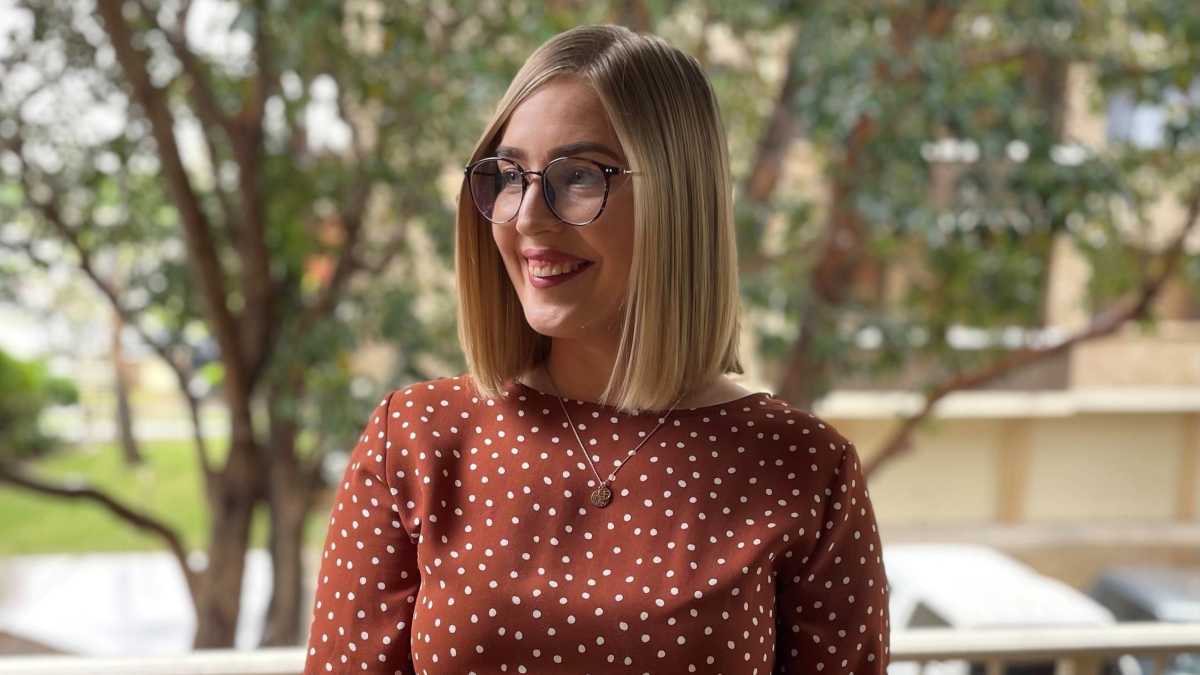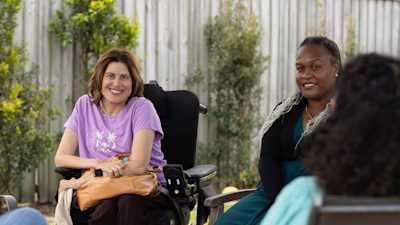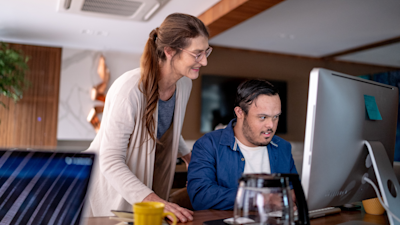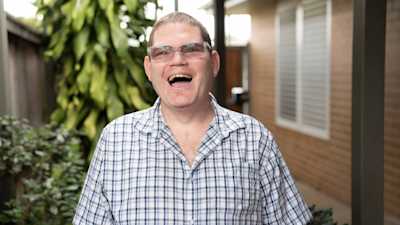We call on the aviation industry to listen to the disability community and act as a matter of urgency.

Image: A woman in a wheelchair at a tram stop.
Life Without Barriers is calling on Australian airlines and the Government to implement better air travel standards that uphold the human rights of people with disability.
Emma Bennison, Chief Innovation Officer at Life Without Barriers, who is blind, was recently abandoned in an airport for over an hour and a half while waiting for assistance from a Jetstar staff member.
Emma said this is one of many instances where Australian airlines have failed to meet support obligations for people with disability.
“To be left alone, with no way to contact staff, for nearly 90 minutes shows the blatant disregard airlines have for me as a person with a disability. It was stressful and humiliating,” Emma said.
“I ultimately had to contact a travel agent to be rescued. Had it not been for their intervention, I might still be there."
Emma said she expects airlines will meet their obligations to uphold her human rights and that when they don’t, it’s up to the person with a disability to hold airlines to account.
“I have had to spend time lodging a complaint which was ignored. Jetstar have failed to provide a meaningful response to my complaint, and in their acknowledgement, the airline couldn’t even manage the basic respect to get my name right. Jetstar still has not responded to the very reasonable requests I have made for the complaint to be resolved," Emma continued.
“I have now lodged a complaint of disability discrimination with the Australian Human Rights Commission."
“This isn’t just a problem with Jetstar, poor treatment for people with disability when travelling by air is across the board. There is a serious lack of regulation in Australia’s Aviation Industry around accessibility so that people with disability can travel with dignity, safety and freedom."

Image: Emma Bennison, Chief Innovation Officer, wearing a light pink shirt and dark pants, stands next to a brick wall with a tree behind her. Photography: Jess Oakenfull, commissioned by the Tasmanian Department of Premier and Cabinet.
Chief Operating Officer, Mark Leigh said as an organisation that works in every state across the country, we must be able to ensure safe and dignified travel for our employees. This is not just an issue for people with disability, it’s a workplace safety concern as well.
“Every employee has the right to safety when they travel, people with disability who may require support should not be treated as second-class citizens by any Australian airline,” Mark said.
“I am deeply concerned that a staff member was left without any assistance by a major national airline, despite the booking being made to identify our staff required disability assistance.
"We expect a response and assurance that the airline is immediately taking action to prevent this from happening again." Mark said.
“We are extremely disappointed that Australia’s Aviation Industry has failed to provide timely and appropriate assistance to one of our senior leaders. There is no excuse for leaving someone waiting in an airport with no update, explanation or guidance.”
Life Without Barriers is calling on the airlines to listen to people with disability and act. We are supporting Emma’s request for an apology from Jetstar and a refresh of the airline's 'Special Assistance' Policy, including the establishment of a dedicated telephone number for customers with disability and compensation for loss of productivity.
This is by no means an isolated incident. Emily Reaper, Innovation Project Lead at Life Without Barriers, was also treated poorly during a recent Qantas flight.
Emily has what is known as an invisible disability, which means people don't always acknowledge that she has one and may require extra support, and kindness. In fact, of the 4.4 million Australians living with a disability, 90% live with an invisible disability, just like Emily.
Emily, who has Myalgic Encephalomyelitis/Chronic Fatigue Syndrome (ME/CFS), did everything right in the lead-up to her flight, including wearing her Hidden Disabilities Sunflower Badge, a badge which staff are meant to recognise and be trained in. Instead, Emily was ignored when she asked the flight attendants for help.
The plane Emily was on was delayed by two hours, and travellers were stuck on the tarmac and not allowed to leave their seats. Emily faced extreme pain and anxiety and was left in tears.
Emily said it wasn't that the plane was delayed, that can't be helped.
"It was the lack of care I was offered."
Qantas claims to be 'a proud member of the Hidden Disabilities Sunflower program' and even, has a section on their website about hidden disabilities. The page outlines that by 'choosing to wear a Hidden Disabilities Sunflower item, such as a lanyard, badge or wristband, you can discreetly signal to our staff at the airport and onboard that you may need help during your journey.'
All of which Emily followed before and during her flight.
"I did everything ‘right’, I wore my sunflower badge, I spoke to the flight attendant – and yet I was provided zero support and care." Emily shared.

Image: Emily Reaper has short blonde hair and is wearing a brown dress with white spots and glasses.
Life Without Barriers would like to see the Federal Government take action to see more regulation around accessibility across the nation’s airlines.
The ABC has also put a spotlight on transport services 'failing' Australians and has listened to hundreds of stories from people with disability who have faced discrimination. They highlighted two key points in their recent article.
The first was the scale of the issue: no matter the type of disability you have, where you live, or the mode of transport you take, getting around is harder than it should be.
The second was that inaccessible public transport leaves the people who rely on it isolated and feeling like it's not worth trying to leave home at all if it means they could be left frustrated, lost, late or out of pocket.
The issues go beyond airlines, with complaints also being raised about trams, buses, and Ubers.


